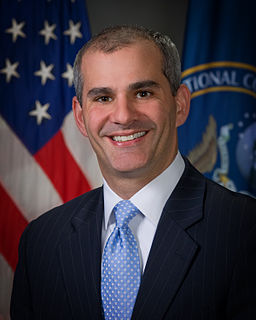A Quote by Ted Lieu
Encryption would help prevent a lot of cyber attacks.
Quote Topics
Related Quotes
It ends a 40-year ban on exporting U.S. oil. It's changed - it's included in its cyber-security legislation - that says to private companies, hey, if you share with us your data on your cyber-attacks, your potential cyber-attacks, we'll give you liability protection. And they authorized a health care program for 9/11 responders for 75 years to cover the length of their lifespans.
There's been a certain amount of opportunism in the wake of the Paris attacks in 2015, when there was almost a reflexive assumption that, "Oh, if only we didn't have strong encryption out there, these attacks could have been prevented." But, as more evidence has come out - and we don't know all the facts yet - we're seeing very little to support the idea that the Paris attackers were making any kind of use of encryption.
In terms of my conversations with [Vladimir] Putin, these are conversations that took place before the election. As I indicated, there has been very clear proof that they have engaged in cyber attacks. This isn't new. It's not unique to Russia. There are a number of states where we've seen low-level cyber attacks and industrial espionage and, you know, other behavior that we think should be out of bounds.
So, in 1993, in what was probably the first salvo of the first Crypto War, there was concern coming from the National Security Agency and the FBI that encryption would soon be incorporated into lots of communications devices, and that that would cause wiretaps to go dark. There was not that much commercial use of encryption at that point. Encryption, particularly for communications traffic, was mostly something done by the government.
The reality is that if you - let's say you just pulled encryption. Let's ban it. Let's you and I ban it tomorrow. And so we sit in Congress and we say, thou shalt not have encryption. What happens then? Well, I would argue that the bad guys will use encryption from non-American companies, because they're pretty smart.
They're implementing what was the strategy of Al Qaeda, which was to have attacks of different levels simultaneously. ... So the idea is, on the one hand you have these spectacular attacks that take months to plan, and others like Reda Hame, a French national, who went to Syria and was there for about a week, given a couple of days of target practice and one day of encryption training, sent back and arrested almost immediately.































